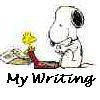Congratulations! You are High-Brow, Peaceful, Experimental and Romantic! These concepts are defined below.
Tove Jansson was a Finnish painter, sculptor and writer. She was part of the Swedish-speaking minority in Finland and so wrote her books, including her most famous works, the Moomin books, in Swedish. The Moomin books (1945-70), though perhaps not considered fantasy by some, are nevertheless fine examples of world-building for children, centred around the inhabitants of the Moomin Valley, where a family of white trolls known as moomin trolls live, and always return to, though they occasionally leave for adventures in the outside world. Though many of the Moomin books are pure childrens’ books, Jansson conducted the experiment of letting the series turn more adult as she went along, the last three books (one collection of short stories and two novels) being psychologically complex stories that are just as fit, or sometimes perhaps more fit, for adults. Still, Jansson’s somewhat romantic vision of the Valley as a peaceful haven of family life in the midst of a sometimes frightening and dark world is retained through-out the books. Though she considered herself a painter rather than a writer, Tove Jansson will always be remembered as one of the greatest, perhaps the greatest writer of children’s books of all times.
You are also a lot like Philip Pullman.
If you want some action, try Gene Wolfe.
If you’d like a challenge, try your exact opposite, David Eddings.
Your score
This is how to interpret your score: Your attitudes have been measured on four different scales, called 1) High-Brow vs. Low-Brow, 2) Violent vs. Peaceful, 3) Experimental vs. Traditional and 4) Cynical vs. Romantic. Imagine that when you were born, you were in a state of innocence, a tabula rasa who would have scored zero on each scale. Since then, a number of circumstances (including genetical, cultural and environmental factors) have pushed you towards either end of these scales. If you’re at 45 or -45 you would be almost entirely cynical, low-brow or whatever. The closer to zero you are, the less extreme your attitude. However, you should always be more of either (eg more romantic than cynical). Please note that even though High-Brow, Violent, Experimental and Cynical have positive numbers (1 through 45) and their opposites negative numbers (-1 through -45), this doesn’t mean that either quality is better. All attitudes have their positive and negative sides, as explained below.
High-Brow vs. Low-Brow
You received 13 points, making you more High-Brow than Low-Brow. Being high-browed in this context refers to being more fascinated with the sort of art that critics and scholars tend to favour, rather than the best-selling kind. At their best, high-brows are cultured, able to appreciate the finer nuances of literature and not content with simplifications. At their worst they are, well, snobs.
Violent vs. Peaceful
You received -25 points, making you more Peaceful than Violent. This scale is a measurement of a) if you are tolerant to violence in fiction and b) whether you see violence as a means that can be used to achieve a good end. If you aren’t, and you don’t, then you are peaceful as defined here. At their best, peaceful people are the ones who encourage dialogue and understanding as a means of solving conflicts. At their worst, they are standing passively by as they or third parties are hurt by less scrupulous individuals.
Experimental vs. Traditional
You received 1 points, making you more Experimental than Traditional. Your position on this scale indicates if you’re more likely to seek out the new and unexpected or if you are more comfortable with the familiar, especially in regards to culture. Note that traditional as defined here does not equal conservative, in the political sense. At their best, experimental people are the ones who show humanity the way forward. At their worst, they provoke for the sake of provocation only.
Cynical vs. Romantic
You received -17 points, making you more Romantic than Cynical. Your position on this scale indicates if you are more likely to be wary, suspicious and skeptical to people around you and the world at large, or if you are more likely to believe in grand schemes, happy endings and the basic goodness of humankind. It is by far the most vaguely defined scale, which is why you’ll find the sentence “you are also a lot like x” above. If you feel that your position on this scale is wrong, then you are probably more like author x. At their best, romantic people are optimistic, willing to work for a good cause and an inspiration to their peers. At their worst, they are easily fooled and too easily lead.
Hum, ok. Clearly, I need to find out more about the Moomins. But I did score the only writer who’s not a native English speaker 🙂
(and for the record, I like Pullman, but could do without the preaching. I do love Gene Wolfe on a good day–defined as one where I have full use of my brain. Used to like Eddings but don’t think I could stomach him now).

